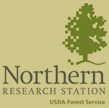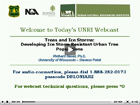Management – Community Based – Environmental Justice
Achieving Policy and Management Goals within a Community
Work by UNRI scientists draws on the theoretical insights of social ecology and human geography to interpret data on ecological and human community stability, land use, and social stratification and ecological processes, and to develop methods for spatial analysis at multiple scales. Interdisciplinary collaboration with other Forest Service researchers and university scientists will bring cutting-edge ecological theory and methods to research in this problem area. Empirical studies of interacting social and biophysical systems are being conducted in the Baltimore Ecosystem Study (BES) Long-Term Ecological Research Program (LTER) and in other urban settings across the Northeast.
Just as they may consider how to manage the ecological structure of urban forest ecosystems, natural resource managers also need to consider how their goals and management alternatives affect and are affected by social structures such as local regional, national, and even international organizations and institutions. UNRI scientists are conduction interdisciplinary research that addresses the linkages between the social and biophysical structures of forest ecosystems that might serve as the basis for such informed urban forest policy, planning and management.
Please visit the Baltimore Ecosystem Study (BES) Long-Term Ecological Research Program (LTER) website , for information on the scope of research that is currently being undertaken by the members of the UNRI research team and their cooperating partners.


